By: Rebecca Mikkelsen

Have you noticed that more mid-career business professionals are returning to college? In October of 2009, 37 percent of part time college students were 35 or older, according to the United States Census Bureau.
Whether it is to complete a bachelor’s degree, earn a graduate degree or extend learning through enrichment and credential programs, workers are realizing that continuing education can help them to keep pace with evolving technologies, business trends, and our globally and regionally competitive marketplace.
So how are our local colleges and universities contributing to workforce readiness, by teaching the skills that local businesses need in their employees? How are they meeting the needs of students, with work-friendly schedules and help with job placement?
Five leaders of esteemed colleges and universities with campuses in the San Fernando and San Gabriel Valleys explain how they are meeting these challenges facing higher education.
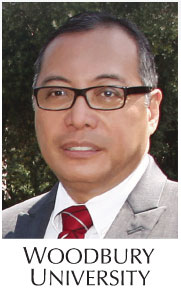
Woodbury University
Luis Ma. R. Calingo, Ph.D,
President
Karl Fisch, a well-known educator from Colorado, may have said it best: “We are currently preparing students for jobs that don’t exist, using technologies that haven’t been invented, in order to solve problems we don’t even know are problems yet.”
That is the crux of the challenge facing higher education today. The amount of new technological information in the world doubles every two years, yet technology also enables companies to do more with fewer people. Increasingly, we must prepare our students to learn strategically – to organize data and process new information more efficiently and make critical decisions under conditions of great volatility, uncertainty, complexity and ambiguity. Ultimately, we also must prepare them to compete for jobs not just with people in their local communities, but with people from all over the world.
So how does that translate into what Woodbury University is doing to address this challenge?
Our core mission is to empower people to do extraordinary things. We will do that by transforming our students into professionals and citizens grounded in both liberal education and social responsibility. We will distinguish our educational offerings through the intentional integration of cross-disciplinary programs, design thinking, entrepreneurship and civic engagement in all of our programs. This requires a focus on creating external partnerships, implementing more effective internal processes and ensuring quality in all our programs and services. It also means that we, as educators, must be accountable for excellence in everything we do. At Woodbury, we’re evaluating our progress against some 30 institutional performance measures.
Technology also compels and empowers us to bring Woodbury University closer to where our students need us to be through growth in our two campuses in Burbank and San Diego. We will also seek new opportunities to reach students, wherever they want or need to be.
Woodbury University graduates have always been prized as strong communicators, ethical thinkers and creative problem-solvers eager for collaboration and continuous learning. That they continue to be recognized as such will be the greatest indicator of our future success. For more information, visit: www.woodbury.edu
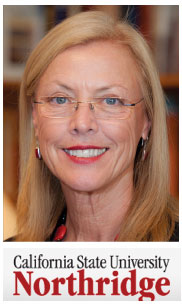
California State University, Northridge
Dianne F. Harrison, Ph.D.
President
The Public Policy Institute of California anticipates that the state in 2025 will be short one million college graduates for the kind of highly educated workers needed. This demonstrates the importance of a college degree for personal and professional success and the state’s economic strength.
At California State University, Northridge, we are proud to help meet this need and prepare students for professional success. Our 36,000+ students have the opportunity to pursue more than 64 baccalaureate, 58 masters and 2 professional doctorate degrees, and 55 teaching credentials – as well as degree, certificate, and enrichment programs for working adults through extended learning.
Despite budget cuts and tuition increases, a college education at CSUN – with its depth of programs and resources, and its strong academic excellence – remains incredibly affordable and will pay dividends in the long term. Our deep connections with businesses and organizations, and CSUN’s ability to give students hands-on experience in the classroom and in the field, makes the CSUN experience particularly rewarding and advantageous.
To help students find jobs, we advise them to follow trends in their fields and take full advantage of the networking opportunities CSUN offers with employers, faculty and alumni and through industry panels and company information sessions, job fairs and internships. Doing internships is the single most important strategy for students in their job search since internships help companies identify and develop talent, and help students acquire professional experience while gaining a competitive edge as an insider within a company. 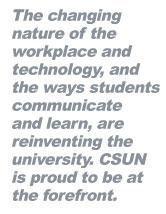
Midcareer professionals have the advantage of CSUN’s exceptional degree and career enrichment programs that are offered evenings and weekends on campus and at employer sites. And in response to demand and new ways of learning, we now offer a number of professionally-focused master’s degrees online and are adding more such programs.
The changing nature of the workplace and technology, and the ways students communicate and learn, are reinventing the university. CSUN is proud to be at the forefront. For information visit: www.csun.edu
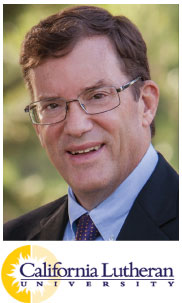 California Lutheran University California Lutheran University
Chris Kimball
President
California Lutheran University's curriculum and programs ensure that our graduates have the knowledge, skills and connections they need to launch or further their careers in today’s world. Within nine months of graduating, more than two-thirds of our traditional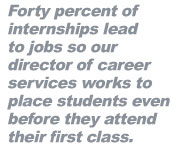 undergraduates surveyed have started a full-time job and the rest are attending graduate school. We are proud of our success rate, and we continue to look for additional ways to give our students a competitive edge. undergraduates surveyed have started a full-time job and the rest are attending graduate school. We are proud of our success rate, and we continue to look for additional ways to give our students a competitive edge.
Forty percent of internships lead to jobs so our director of career services works to place students even before they attend their first class. Last year we piloted a nonprofit internship program that enables students to work for organizations about which they are passionate and we will officially launch it this fall.
We are also increasing our emphasis on entrepreneurship to help students create their own opportunities. The launch of new businesses is vital to economic growth and the rewards can be great, but the risk of failure is high. It’s crucial that people have the knowledge and tools necessary for success. We offer an entrepreneurship track in our MBA program and a post-MBA certificate in entrepreneurship. In June, our School of Management brought back its free Entrepreneur Roundtable lecture series for the public. We are also working to start a Center for Entrepreneurship and Growth that will provide training programs.
Helping to guide our entrepreneurship efforts are two distinguished new faculty members in the School of Management. Visiting Professor Bill Gartner is the world's most-cited scholar on entrepreneurship and a co-founder of the Entrepreneurship Research Consortium. Assistant Professor Nelson Pizarro has founded six companies and conducted business in 46 countries.
With guidance from Gartner, Pizarro and others on our faculty and staff who keep abreast of the needs of students and employers, I am confident that CLU will continue to evolve to adapt to tomorrow’s world. For information visit: www.callutheran.edu
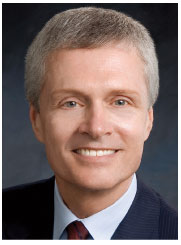
Glendale Community College 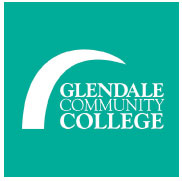
David Viar, Ph.D.
Superintendent/President
Community colleges play a vital role in preparing, educating, and training students to be productive in the workforce. Throughout our 85-year history, Glendale Community College has strived to create innovative programs and certificates to meet the changing demands of our economy. Together with our faculty, administrators, and workforce development partners, Glendale College has been able to leverage resources and provide our students with opportunities for success relevant to today’s business needs.
The Career and Technical Education programs at Glendale Community College work in partnership with the Verdugo Workforce Investment Board, LAEDC, local employers, and K-16 educational institutions to offer relevant and rigorous certificates and degrees that reflect skill sets and knowledge necessary to enter into the workforce and upgrade skills to move up in their careers. GCC has a Job Developer in the Placement Center actively recruiting and placing students.
Glendale College’s Professional Development Center (PDC) is recognized statewide for their continued success with delivering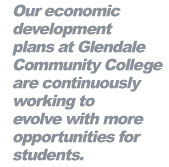 workforce training opportunities to hundreds of local businesses. Partnerships with the Small Business Association, the Valley Economic Alliance, and local Chambers of Commerce have assisted our PDC with quickly responding to the current training needs of industry. Through the collaborative efforts of the employers and GCC partners, many of our students have been able to gain hands-on experience with internships and employment within our community. workforce training opportunities to hundreds of local businesses. Partnerships with the Small Business Association, the Valley Economic Alliance, and local Chambers of Commerce have assisted our PDC with quickly responding to the current training needs of industry. Through the collaborative efforts of the employers and GCC partners, many of our students have been able to gain hands-on experience with internships and employment within our community.
Our economic development plans at Glendale Community College are continuously working to evolve with more opportunities for students. With the talent and creativity of the GCC faculty and college personnel, aligned with dynamic industry partners, Glendale Community College continues to be positioned to deliver quality education training programs to our students, giving them the knowledge and skills necessary to compete and succeed in today’s economy. For information visit: www.glendale.edu
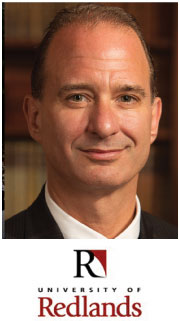
University of Redlands
Stuart Noble-Goodman PhD,
Dean for the University of Redlands, School of Business and H. Jess & Donna Senecal, Endowed Dean’s Chair in Business
Numerous national surveys have indicated that employers are looking for employees who possess a broad liberal educational focus—communication and critical thinking skills, analytical abilities, and global intercultural competence. Employers want employees who can understand business problems, analyze those problems effectively, formulate viable and innovative solutions to those challenges, and finally, communicate those solutions coherently to management and co-workers, both orally and in writing.
That’s why every program at the University of Redlands, School of Business includes courses that are specifically focused on cultivating critical thinking, analysis, and presentation skills. The liberal arts framework at Redlands facilitates students’ understanding of the broader social, ethical, and economic contexts of business decisions by framing questions incisively and considering multiple perspectives
Unlike most degree completion and accelerated adult programs, Redlands offers students 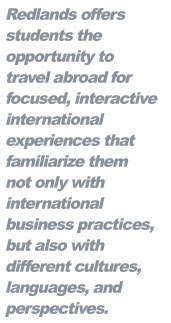 the opportunity to travel abroad for focused, interactive international experiences that familiarize them not only with international business practices, but also with different cultures, languages, and perspectives. These intensive, two-week courses to destinations such India, China, Scandinavia, Southern Europe, and the U.K., enrich students’ perspectives and provide them with a competitive advantage in a 21stcentury integrated global marketplace. the opportunity to travel abroad for focused, interactive international experiences that familiarize them not only with international business practices, but also with different cultures, languages, and perspectives. These intensive, two-week courses to destinations such India, China, Scandinavia, Southern Europe, and the U.K., enrich students’ perspectives and provide them with a competitive advantage in a 21stcentury integrated global marketplace.
As many working professionals are discovering, advancing one’s career without at least a bachelor’s degree can be difficult, if not impossible. Even professionals with substantial career experience need to complete a bachelor’s degree or earn a graduate degree to keep pace in a globally and regionally competitive marketplace.
For four decades, the University of Redlands, a private nonprofit university, through its School of Business, has provided working adults with relevant, quality degrees in business administration and management through a powerful educational experience that works with busy lives. Classes are held one evening per week, in nine regional campuses located throughout Southern California, with multiple enrollment dates throughout the year for convenient start times. The University’s Los Angeles locations include Burbank and Torrance, as well as partner site programs at major regional employers, including the Jet Propulsion Laboratory (JPL) and Cal Tech.
New students pursuing undergraduate degrees are eligible to receive significant course credits for life and professional experiences. For more information, email SchoolOfBusiness@redlands.edu, or call Laura Mathiasen, our Burbank campus director, at (818) 840-1180.

|